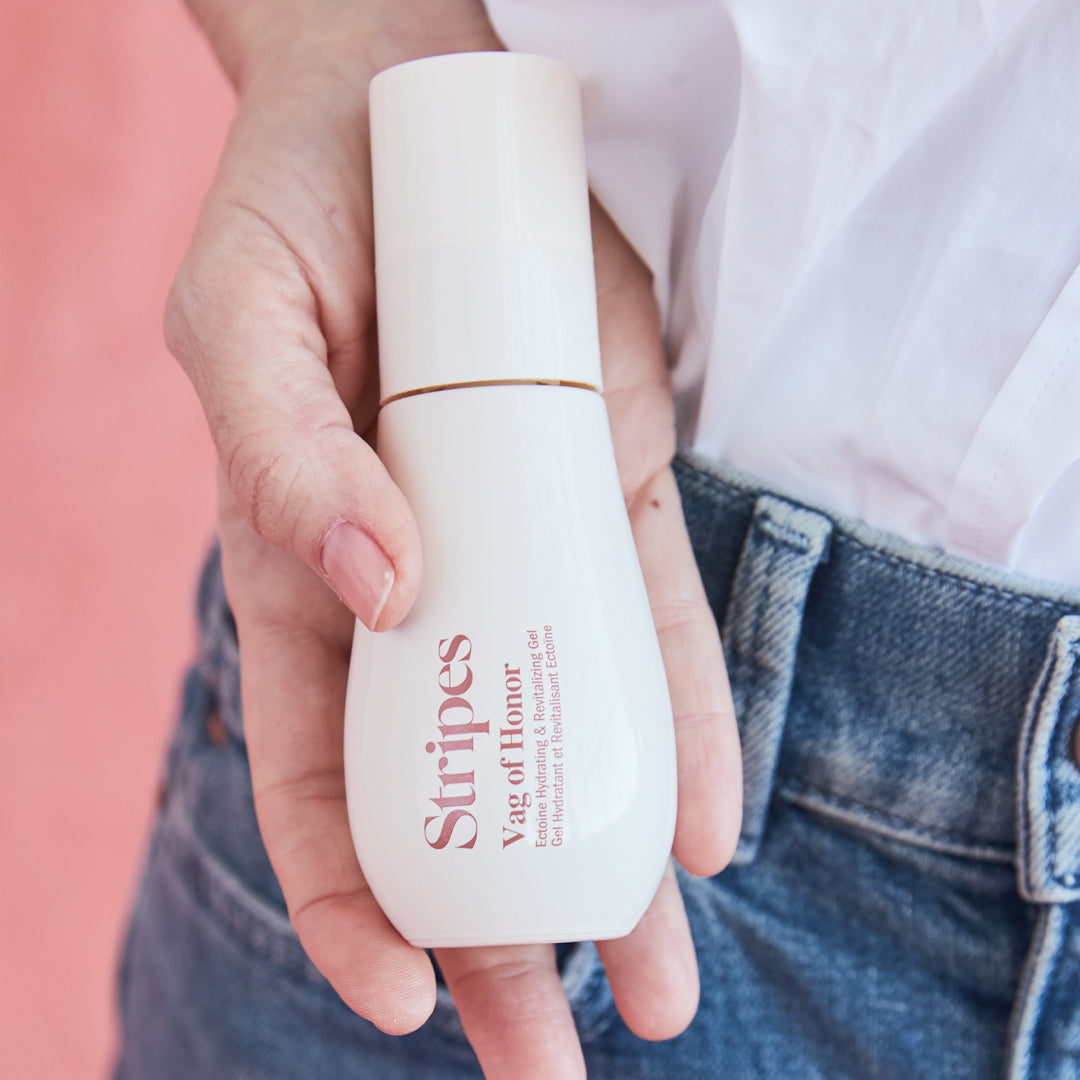Sex During (And After Menopause): How to Ask for What You Want Now
When you enter midlife, aspects of your sex life will likely begin to change. Some of those changes will be great — things like feeling more comfortable in your body or having an easier time staying focused during sex — but others might take some getting used to. For people with vulvas, one of the most noticeable changes during peri/menopause is vaginal dryness. As your estrogen and progesterone levels decrease, the vagina loses elasticity and lubrication. Your testosterone levels also dwindle, which can cause your libido to also take a dip.
You may find that you have to work harder to create desire within yourself, or that you need to reach for items like lube more frequently before intercourse. But the sex changes of midlife aren’t just hormonal. You may also struggle to ask for what you want, especially if you’ve been with your partner for a long time and you haven’t talked about sex in a while. Desire tends to build mentally instead of physically as people get older, both in penis owners and vulva owners, but that doesn’t mean red-hot intimacy is out of the question.
It can be hard to tell a partner that what used to work well for you isn’t feeling as good anymore, and shifts in libido can sometimes leave people feeling undesirable unless they’re discussed. As your hormones change and your sex needs follow suit, it's important to know how to ask for what you want from your partner or partners. Here’s how, according to a sex expert.
How to ask for what you want in bed
Communicating about your sex life — either with a new partner or a long-term one — can bring up a lot of anxiety. If you struggled to communicate your sexual needs earlier on in life, it can feel daunting to start asking for your needs to be met now.
According to Casey Tanner (they/them), a certified sex therapist and founder of The Expansive Group, a team of therapists, coaches, and educators that provide intersectional, pleasure-positive services for individuals and couples, one great way to learn how to talk about sex is to start listening to people talking about sex. Instead of preplanning your speech or reading articles online (yes, including this one), they suggest finding podcasts or audiobooks where people “talk about sex in a way that is comfortable and informed,” so you also feel more comfortable when you bring it up with your partner.
When you’re ready to have the conversation with your partner, Tanner says it’s best to determine what you can bring to the discussion — and to come from a place of curiosity, not criticism.
Ask your partner lots of questions, stay away from using extreme language (like “you always” or “I hate”), and come with suggestions. For instance, instead of “I hate that you always go to sleep right after sex,” try “I really love it when we talk after sex. Can we try to prioritize having sex earlier in the day so we can enjoy each other’s company after we’ve finished?”
When you work together with your partner to find solutions, it’s easier to make the changes to your sex life that you need to feel sexually fulfilled.
When and where to ask your partner for what you want in bed
Another important part of discussions about sex, according to Tanner, is not just what you talk about but when you talk about it. Sex and right afterward “can be a really vulnerable time.” Instead of talking about sex as it happens, they recommend taking a walk or doing something else that brings you “together in parallel.”
When you take a walk together, you have something else to do and somewhere else to look. If you’re struggling to ask for what you want, talking as you walk can make the discussion feel safer and less awkward, especially if it’s the first time (or the first time in a while) that you’ve had it. Ask your partner if they’d feel comfortable discussing your sex life first, and have these conversations when the clothes are on.
If you’re still struggling to talk about sex after trying a few of these techniques, then maybe it’s time to bring a sex therapist into the discussion.
Not sure where to start? Try rekindling the spark
In new relationships, sex tends to be easy. Every experience you share together is novel and comes with its own built-in excitement and anticipation. As time passes, you gain a lot of trust, love, and closeness, but it’s common to lose some of that initial passion.
If you’re in a long-term relationship and you’ve been missing that first-date spark, Tanner recommends re-creating elements of that early time together. Try going on your first date again, or plan a similar date with what’s available to you now. If you still live in the area where you met, they say to “take a drive to a place that was important to you when you were younger,” and use the opportunity to talk about “what it was like to meet each other for the first time.”
Put yourselves and your bodies in the same spaces you used to occupy when you felt a lot of instant passion for each other: How did it feel to kiss for the very first time? Did you get a rush when you first saw each other naked? What was your first time like, who made the first move?
The best sex of your life: What to look forward to in midlife
There’s a myth in today’s youth-driven culture that young adults are having the most and the best sex. Let us dispel that myth for you: Sex is a skill just like anything else, and as you age, you get better and better at knowing what makes you feel good and what might feel good for your partner. With solid communication (and maybe a little — or a lot — of lube), your sex and masturbation life can reach new heights after menopause.
By Rae Chen
Rae Chen (they/them) is a queer Canadian writer who covers sex, tech, and beauty in between decaf oat milk lattes and trips to the dog park. Their work and interviews have been featured in Teen Vogue, SELF, InsideHook, Bloomberg, and more. You can find more of their writing at https://theNotice.net.
Looking to connect with a community of women who know what you're going through? Check out The Hot Spot!











